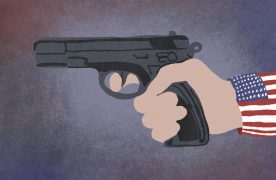Andrew Cohen, a former editor of The Daily Free Press, is a CBS News legal analyst and commentator.
Whatever small contribution I already may have made to journalism in my brief time as a legal analyst, and whatever good I may ultimately achieve in what I hope is a long career in this noble profession, I owe and dedicate to James C. Thomson, Jr. — my professor, my mentor, and my friend — who died last month near his home in Cambridge.
At BU’s College of Communication in the mid-1980s, he taught me how to read and write like a journalist and, most importantly, the value of learning for learning’s sake. He turned me on to the writings of Walter Lippmann and literally introduced me to Anthony Lewis, a man whose writing and reportage would ultimately change my career and my life.
Jim Thomson pushed me to think more clearly and to anticipate what my audience would want and expect. He made me want to be a serious student and contribute something to the nation’s dialogue. He made me see the value of and virtue in striving to make a difference. Not a day goes by in my professional life when I do not think of and apply one of the many lessons Professor Thomson taught me during the years in which I studied with him at BU.
He taught me about cigars, too. On the rare occasion I smoke, I smoke his brand, Te Amo, and think about his favorite subject, China. I can still remember him sitting in his small office at BU, smoking a cigar, and telling me the story of his mother and Pearl Buck, the author of one of the best books ever written, “The Good Earth.” Mrs. Thomson and Mrs. Buck were buddies, neighbors, and they often shared their writings with each other, he would say. One day, the professor continued, Mrs. Buck stopped reading her stuff to Mrs. Thomson over the clothesline. Only months later, “The Good Earth” was published. I can still remember the Professor telling me, “My mother should have known something was up.”
When I was broke my senior year, he arranged to get me a job working in his office; a job that allowed me to read and study and work on the student newspaper even as I collected a paycheck. At the time, he was not particularly in favor with BU’s administration or the college itself. I wasn’t either because of my work for the newspaper, but I will always remember the look of absolute shock on the face of some of those administrators when they came to find me, alone, chatting with the great John Kenneth Galbraith before a speech he was to deliver later that day. Professor Thomson had arranged the impromptu meeting, I know, allowing me the exposure and he the opportunity to needle his bosses, who didn’t necessarily want me to be the first face Galbraith saw at BU.
But his guidance, help and support didn’t end at school. He and his lovely wife Diana, now also sadly gone, invited me to their cramped Cambridge house on occasion for a meal. I still can see in my mind’s eye all the books, the papers, the magazines and the cats, seemingly Hollywood’s stereotypical professor’s abode. What marvelous times we had and I was always so proud when I got invited.
After I finished law school, the Thomsons helped me network in the legal world and when I became a journalist again I made sure to call Jim Thomson to tell him that I had finally come around. He was happy — truly happy — I could tell in his voice.
I didn’t know it then but Jim Thomson taught me about courage, too. It was only after I left his orbit that I realized how profoundly courageous he had been to talk out against the Vietnam War, not as early as some but certainly earlier than others. Had the government heeded his advice on Vietnam and China a little earlier than it ultimately did, a lot of American lives would have been saved.
The day he died, I was handling his fine book, “While China Faced West,” as I packed it away for a move. I looked through all the passages I had underlined decades ago and thought to myself, what an accomplishment it would be if I could one day write a book as smart and as important as Professor Jim Thomson’s.
This is an account occasionally used by the Daily Free Press editors to post archived posts from previous iterations of the site or otherwise for special circumstance publications. See authorship info on the byline at the top of the page.












